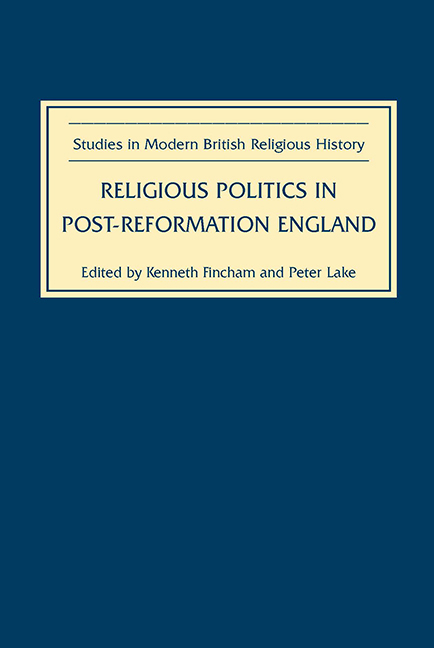Book contents
- Frontmatter
- CONTENTS
- Dedicaton
- Miscellaneous Frontmatter
- Preface
- Abbreviations
- 1 Introduction: Puritanism, Arminianism and Nicholas Tyacke
- 2 Art and Iconoclasm in Early Modern England
- 3 The Latitude of the Church of England
- 4 Joan of Contention: The Myth of the Female Pope in Early Modern England
- 5 Anti-Puritanism: The Structure of a Prejudice
- 6 The Fortunes of English Puritanism: An Elizabethan Perspective
- 7 What's in a Name? Dudley Fenner and the Peculiarities of Puritan Nomenclature
- 8 Puritan Preachers and their Patrons
- 9 New England's Reformation: ‘Wee shall be as a Citty upon a Hill, the Eies of All People are upon Us’
- 10 ‘Anglicanism’ by Stealth: The Career and Influence of John Overall
- 11 Destroyed for doing my Duty: Thomas Felton and the Penal Laws under Elizabeth and James I
- 12 Charles I and Providence
- 13 John Shawe and Edward Bowles: Civic Preachers at Peace and War
- 14 Material Evidence: The Religious Legacy of the Interregnum at St George Tombland, Norwich
- Index
- Tabula Gratulatoria
- Studies in Modern British Religious History
12 - Charles I and Providence
Published online by Cambridge University Press: 25 October 2017
- Frontmatter
- CONTENTS
- Dedicaton
- Miscellaneous Frontmatter
- Preface
- Abbreviations
- 1 Introduction: Puritanism, Arminianism and Nicholas Tyacke
- 2 Art and Iconoclasm in Early Modern England
- 3 The Latitude of the Church of England
- 4 Joan of Contention: The Myth of the Female Pope in Early Modern England
- 5 Anti-Puritanism: The Structure of a Prejudice
- 6 The Fortunes of English Puritanism: An Elizabethan Perspective
- 7 What's in a Name? Dudley Fenner and the Peculiarities of Puritan Nomenclature
- 8 Puritan Preachers and their Patrons
- 9 New England's Reformation: ‘Wee shall be as a Citty upon a Hill, the Eies of All People are upon Us’
- 10 ‘Anglicanism’ by Stealth: The Career and Influence of John Overall
- 11 Destroyed for doing my Duty: Thomas Felton and the Penal Laws under Elizabeth and James I
- 12 Charles I and Providence
- 13 John Shawe and Edward Bowles: Civic Preachers at Peace and War
- 14 Material Evidence: The Religious Legacy of the Interregnum at St George Tombland, Norwich
- Index
- Tabula Gratulatoria
- Studies in Modern British Religious History
Summary
Royalist providentialism is not a topic that has received a great deal of attention from historians. In the most authoritative recent accounts of providence, both Alexandra Walsham and Blair Worden acknowledge its existence; but neither devotes much space to exploring what it meant. The guiding assumption is that insofar as providential ideas were applied to politics this was mainly done by puritans. The godly believed that they were uniquely equipped to interpret the sovereign decrees of an all-controlling Calvinist God, and indeed that it was their duty to do so. Through an understanding of God's judgments, they were convinced that they could discern something of God's purposes for mankind. Hence the angst-ridden soul of puritan diaries and autobigraphies as the authors strove to gain an insight into the meanings of the various ‘mercies’ or ‘afflictions’ that they encountered, and also secure some measure of assurance that they were numbered among his elect saints. Worden has demonstrated that these concerns had a profound influence on the ministers and politicians of the puritan revolution. The clearest example of this was Oliver Cromwell, who oscillated between elation and self-confidence when military victory seemed to confirm that he was doing God's will, and doubt and indecision when – particularly with the failure of the Hispaniola expedition of 1655 – God's purposes appeared unclear. For Worden providence was a crucial dynamic of the revolutionary changes of the late 1640s and 1650s. It gave radical politicians the courage and flexibility to push forward, confident that the Lord was on their side; and it furnished them with a language with which to justify the most dramatic breaks with the past, notably in the trial and execution of the king. At the heart of radical decisionmaking, Worden argued, there was ‘one perception which dwarfed all others: that to disobey God's will was to invite the likelihood of retribution and disaster’.
If providence played such an important role in the thinking of puritan politicians what impact did it have on royalists? Walsham has demonstrated that the belief in an interventionist deity whose judgments were visited on those who sinned was never confined to the godly.
- Type
- Chapter
- Information
- Religious Politics in Post-Reformation England , pp. 193 - 208Publisher: Boydell & BrewerPrint publication year: 2006



